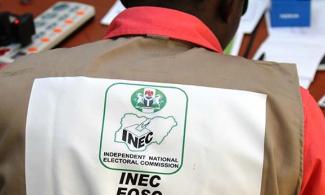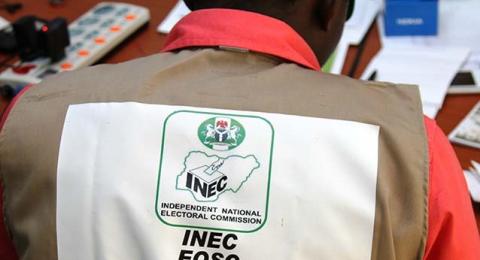
The electoral body has expressed fears over the 2023 elections, stating that there would be no results at polling units where violent incidents were orchestrated.
The Independent National Electoral Commission has lost no fewer than 9,836 smart card readers in over 42 attacks on its offices and staff in three years.
Also, more than 1,149 persons, including INEC employees and security officers were killed in the three elections held in 2011, 2015 and 2019. Ballot papers, cubicles and other materials were similarly destroyed, Punch reports.

Last Friday, an INEC worker identified as Anthony Nwokorie, was shot dead by gunmen while conducting the continuous voter registration in the Ihitte Uboma Local Government Area of Imo State.
A viral video showed the hoodlums forcing registrants to lie on the ground while destroying registration materials and vowing that elections would not hold in the South-East.
Following the violent assaults on its assets and staff, the electoral body has expressed fears over the 2023 elections, stating that there would be no results at polling units where violent incidents were orchestrated.
The Resident Electoral Commissioner in Akwa Ibom State, Mike Igini, in an interview with Punch on Monday, warned that no return would be made where violence was deliberately precipitated to undermine the electoral process.
Describing the attacks on the commission as regrettable, the resident electoral commissioner assured Nigerians that the body was devising strategies to protect its offices, assets and personnel ahead of the 2023 general election.
Igini, a lawyer, said it was a disgrace that the political elite prepared for elections as if going to war, noting that the election period should be a time of stock-taking and Election Day, a day for renewing the journey of the country for a new direction.
Responding to a question about what was being done to better protect INEC employees, assets, and voters, he said a risk assessment would be conducted to evaluate hazards and risks before the general election, including “mapping of persons of interests and so on,” by the Inter-Agency Consultative Committee.
Igini stated, “There are things that will be done but much of it cannot be a matter for publication. However, it is important, if we must reassure the voting public for the commission to work with stakeholders to ensure that a speedy example is made with some people to convey the message to the public that there is zero tolerance for such hazards and that voters will not only be protected, but also seen to be protected.”
Asked if results in places that recorded violent incidents would be cancelled, the REC said, “There has to be an election first before talking of result cancellation. Where violence is orchestrated deliberately to undermine the process, there will be no return made and nothing to cancel.
“Cancellation of election results is a sensitive process that follows a step-wise statutory procedure of auditing because as I pointed out above, political actors may also foment violence for electoral purposes. If results are justifiably cancelled, it will be such as not to reward deliberately orchestrated electoral violence.”
On whether there would be special security arrangements for electoral officials during the 2023 polls, Igini said, “If necessary, yes; if the risk analysis requires special measures, they have to be in place for the affected area, otherwise, the commission will have to give notice as we have always done in the past that the conditions are not conducive.”
Investigations indicate that the electoral body had lost assets estimated at billions of naira to violence carried out by thugs and other hired hoodlums.